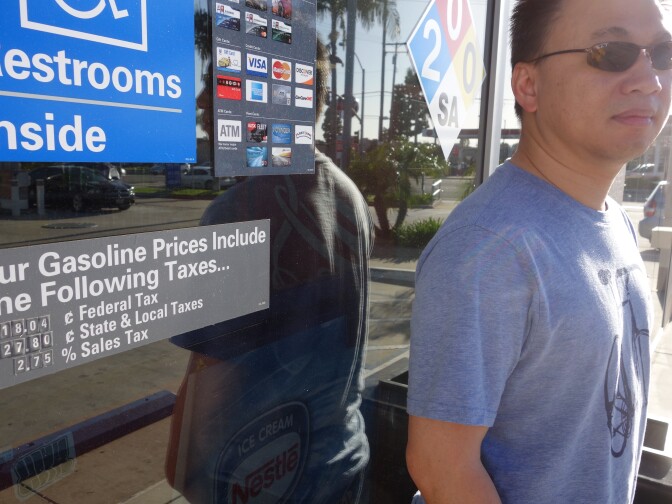This story is free to read because readers choose to support LAist. If you find value in independent local reporting, make a donation to power our newsroom today.
This archival content was originally written for and published on KPCC.org. Keep in mind that links and images may no longer work — and references may be outdated.
Drivers: What you need to know about changes in the gas tax
It took well into Thursday evening, but the California legislature mustered a two-thirds majority to pass an increase in the state gas tax for the first time in decades. The tax is used to repair roads and freeways. The increase is meant to close a multi-billion dollar backlog of repair projects. A bill boosting the gas tax now heads to Gov. Jerry Brown for his signature.
How much is the gas tax right now?
Every gallon of gas you buy in California today carries a nearly 28 cent state tax. That tax is a combination of two different taxes, one that stays the same from year to year and another that mimics a sales tax, rising falling with the price of gas.
Why did lawmakers want to increase it?
That gas tax is volatile. For example, when gas prices approached $4 a gallon in 2014, the gas tax was at 39 cents a gallon. The problem with volatility is it makes it hard to plan road repairs and construction years ahead. Just over half the state's current $7.2 billion transportation budget comes from state gas tax. The rest comes from diesel fuel taxes (also volatile), from large vehicle weight fees and from a few other sources.
What's the proposed increase and what does it mean to drivers?
Two-thirds of the state Senate and Assembly voted to approve the bill known as SB1. It's now on its way to Gov. Jerry Brown for his signature. Under the plan, the per-gallon state gas tax would increase by 12 cents. It would also be indexed to increase with inflation beginning in 2020. The current tax does not rise with inflation.
Similar increases would also kick in for diesel fuel, with an additional 20 cent tax per gallon plus a 4 percent increase in the rate of the sales tax.
The bill also adds new registration fees of $25 to $175 charged on a sliding scale based on the value of the vehicle.
Do drivers of electric and other zero emission vehicles escape these increases?
Yes, but they would start paying a different tax. The bill imposes a new $100 fee for zero emission vehicles beginning in 2020. And that's on top of normal vehicle registration fees.
Even though Gov. Brown has advocated putting a million of these environmentally friendly cars on California roads, they have not been contributing to road repairs and new construction. That would change under the new law.
How would the new money be spent?
The bill raises about $52 billion over ten years, about $5 billion in its first year. In that initial year, the plan is to split about $3 billion evenly among state and local governments for road repairs. It would also earmark $1 billion on new construction. About $785 million would go to transit construction and operations. Another $150 million would go to improvements for walking and cycling projects, and freeway patrol.
How do we know the Legislature won't divert these new taxes to other uses?
A companion bill would amend the state Constitution to limit the new transportation-related taxes to transportation purposes.











